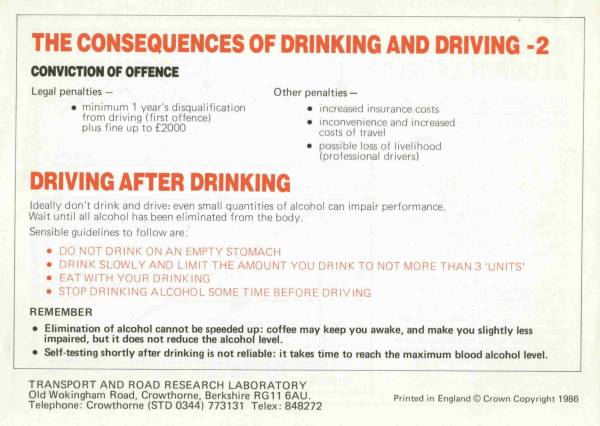Highway Code Changes
The current advice on drinking and driving in the UK Highway Code is as follows:
83: Do not drink and drive as it will seriously affect your judgement and abilities. You MUST NOT drive with a breath alcohol level higher than 35 µg/100ml or a blood alcohol level of more than 80 mg/100 ml. Alcohol will
|
This is not in itself unreasonable, although it would be preferable if the fourth point was prefaced by "may" rather than "will", as it is incorrect to state that any level of alcohol, however low, will affect driving ability.
The government are currently consulting on various changes to the Highway Code. The official consultation can be found here. They propose adding the following comment:
| The best solution is not to drink at all when driving, because any amount of alcohol can impair driving ability. |
I will concede there is a point to the "don't drink at all when driving" message, as it avoids all doubt, and can never be regarded as bad advice. But unfortunately it is all too easy to infer that the opposite also applies, that to drink at all when driving is per se dangerous. This is simply untrue, as explained elsewhere on this website, and the comment "any amount of alcohol can impair driving ability" has the strong implication of reinforcing this argument.
In fact, for the vast majority of people, two units of alcohol or less is highly unlikely to result in any measureable impairment. Large numbers of people in UK routinely drive with alcohol levels above zero, but comfortably within the legal limit, and to imply that this behaviour is inherently irresponsible is tendentious and dishonest. Offical publications should not make generalised statements based on the reactions of a tiny minority.
This message, as it is a self-evident exaggeration, and also not in accordance with what the law says, will inevitably tend to undermine trust in all official pronouncements.
The additional comment would have been better phrased as:
| To avoid any doubt, it is best not to drink at all when driving. Driving ability can be impaired by alcohol levels below the legal limit. |
But in my view the existing guidance is entirely clear, and no further statement is needed. I would prefer the Highway Code to say:
| 83: Do not drink and drive as it will seriously affect your judgement and abilities. You MUST NOT drive with a breath alcohol level higher than 35 µg/100ml or a blood alcohol level of more than 80 mg/100 ml. Your driving ability may be affected even at levels below the legal limit.
Alcohol will:
|
Perhaps it would be asking a bit much to expect the Highway Code to incorporate the advice given in a Transport and Road Research Laboratory booklet issued in 1986:

(Page created March 2006)